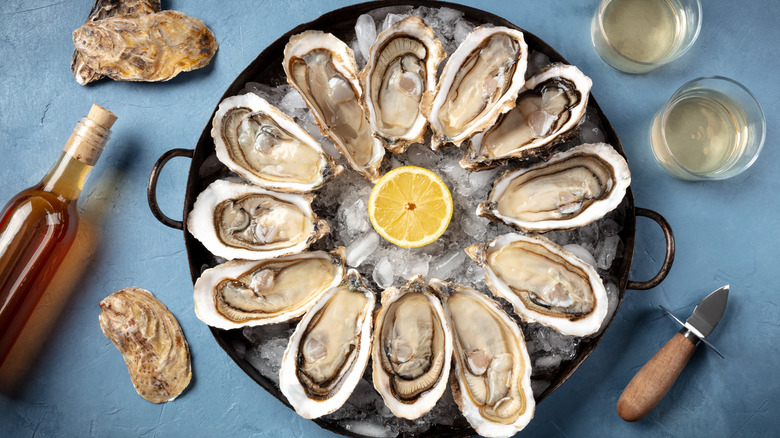Are Oysters Really An Aphrodisiac?
Let's face it: oysters' claim to fame is that they make you crave sex. For centuries, the seawater mollusks have been used to boost sexual desire and sex drive, and get you into the mood for love due to their natural aphrodisiac powers. They are thought to rear up those infamous senses — sight, sound, touch, smell, and taste, points out WebMD. But, is eating oysters to stimulate the human sex organs fact or fiction? Research suggests it may be a little of both.
Historically there are five types of aphrodisiacs and oysters fall into the category, "if it looks like a sexual organ..." (per WebMD). It's believed that if a food resembles the nether regions (a.k.a. private parts) of males or females, sexual desire increases (via WebMD). While this theory is unproven, it's widely accepted, thanks to its squishy yet slimy texture and shape.
Beyond its chewy texture, oysters are loaded with nutrients that support sexual health. In particular, they contain omega-3 fatty acids. According to a 2016 study published in the Journal of Korean Medical Science, omega-3s can improve erectile function, which may help with erectile dysfunction. The researchers pointed out this may be due to omega-3s' ability to increase blood flow. In addition to improving blood flow, omega-3s also support heart health, protect against cardiovascular disease, and reduce inflammation (via Healthline).
Other ways oysters may boost the mood for love
Believe it or not, another reason why oysters get their aphrodisiac reputation is because they contain zinc. Zinc is an important nutrient needed for sexual health, fertility, and testosterone levels (via MedicalNewsToday). Healthline shares that oysters contain more zinc per serving than any other food. For example, one raw oyster (about 14 grams) contains 5.5 milligrams of zinc, according to the U.S. Department of Agriculture. This is nearly half the recommended daily amount that the National Institutes of Health suggests for adult women (8 mg) and men (11 mg).
Not only does zinc support sexual health, but it also supports a neurotransmitter. According to a 2019 study published in Experimental Neurobiology, zinc helps the body maintain adequate levels of the neurotransmitter, dopamine. Dopamine creates those pleasurable feelings, and MedicalNewsToday indicates that it may have a role in sexual function.
Oysters also contain another compound that may potentially support testosterone production (via MedicalNewsToday). This compound is an amino acid called D-aspartic acid, and research suggests it may boost sexual arousal.
Even though oysters are loaded with nutrients, further research is needed to understand their impact on sexual health. Oysters are generally considered a healthy addition to a diet. However, if you're looking for more tried-and-true aphrodisiac foods, don't forget these other options: strawberries, chocolate, asparagus, and avocado.


